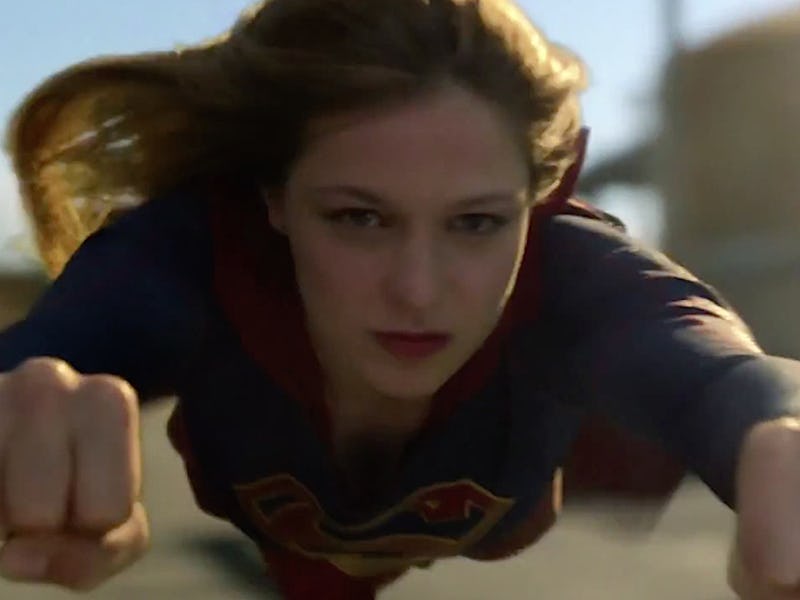What to Expect From 'Supergirl': Exposition, Feminism, and Not-Superman
CBS' Supergirl has the pilotiest pilot that ever piloted

Supergirl premieres Monday on CBS. Here’s what to expect from the pilot episode.
Supergirl is the first of the recent superhero shows to land on CBS, which is often considered the most traditional network largely because it’s also been the most successful. This means it’s going for the broadest possible audience, and doing so by painting in extremely broad strokes. It opens with reams of exposition, explaining the Superman-adjacent origin of Kara Danvers/Supergirl over several minutes.
Once the show proper starts, the dialogue remains extremely direct. Kara (Melissa Benoist), who works at a publishing company, questions her boss Cat (Calista Flockhart, the ruthless queen bee of the office) about why layoffs at the local paper are necessary. Flockhart responds that Metropolis has a costumed hero and National City doesn’t, so its papers don’t sell, giving the bleeding-heart Kara a motive to consider superheroics. Almost everything is written in bold like that, with tensions set up and resolved for emotional resolution alongside the episode’s plot resolution.
This doesn’t sound good — and, on the writing level, it isn’t great — but the bold sweeping Superhero Origin level of the story works really well on the visual level. Director Glen Winter does everything he can to make Supergirl look iconic. Benoist tears off her glasses with flair, mimicking the traditional Clark Kent move. And every time she’s in costume, the camera lingers on her striding resolutely, or hovering before an attack. These moments almost all look and feel right, not just for Supergirl, but for anything engaging in the superhero mythology.
The dialogue is almost certain to improve over time, as relationships are established between the characters on-screen and with the viewers off it and exposition becomes less necessary. The visual style, meanwhile, provides a solid metaphoric base for the series moving forward.
‘Supergirl’ knows its place in the discourse
When Kara’s first feat of heroism is made public, all the world knows is that there’s a superpowered woman. It’s enough for the conversation surrounding the hero to turn into the conversation surrounding the show. A server at a diner, seeing a news report, proclaims that her daughter finally has a hero of her own to look up to.
That’s certainly true in the show’s world, but it’s not talking about the show’s world. DC’s television properties have been remarkably successful, but Arrow, Gotham, The Flash, and the now-cancelled Constantine are all male-centered. Over in the movie world, Marvel’s wildly successful Cinematic Universe will have over a dozen films before its first with a female lead, and DC, while planning a Wonder Woman, hasn’t successfully released a live-action film for that heroine in their history.
There is a lot riding on Supergirl to be a standard-bearer for women in live-action comic adaptations, and for the run of the pilot it’s happy to lean into that role as enthusiastically and superficially as it can. There is, for example, an argument to be made about whether “Supergirl” is a diminishing name for a woman hero. But when Benoist brings it up to Flockhart, the power imbalances of the scene - the boss can fire the subordinate, while the hero knows her own identity and is keeping it secret - render discussions of any depth impossible.
It’s hard to see how Supergirl can go into complicated discussions if it keeps aiming for mass appeal. In-depth self-aware examinations of any issue, let alone feminist portrayals in media, are not known for encouraging mass appeal. It’ll take time and confidence for Supergirl to have a chance at transcending this.
There’s a complicated relationship with Superman, er, the Man of Steel
The most distracting thing about Supergirl’s pilot is that the characters don’t say “Superman.” Throughout the entire run of the pilot episode, the characters deliberately avoid referring to Superman as Superman, even though his shadow hangs over the episode (literally, in one instance.) Instead we get “Kal-El,” “the Man of Steel,” “the big guy,” “my cousin,” and more.
Whether it’s a legal necessity, a studio decision, or a deliberate attempt by the show’s writers to make sure it’s about Supergirl and not Superman, it’s extremely noticable to the point of annoyance. And the showrunners are publicly ambivalent about connecting this show to the other DC TV show, so Supergirl is unlikely, initially, to feel like a part of a wider interconnected universe with crossovers.
Melissa Benoist and Mehcad Brooks
On the other hand, the connection to the larger Superman world also brings Supergirl’s initial standout character, James Olsen (Mehcad Brooks). Brooks brings a low-key charm and a non-threatening handsomeness to the proceedings, which is quite welcome. But most of all, in an episode filled with declarative statements and people needing answers, Brooks just slyly watches, having all the answers he wants or needs, and guiding others to knowledge he has about heroics, having been Superman’s best friend.
The competence with which Olsen is written and portrayed bodes well for Supergirl overall, once it clears its exposition out of the way and lets its characters be characters instead of exposition and personality trait delivery devices. Supergirl’s creators have a lot of experience making superhero shows, with exposition-riddled and personality free duds like No Ordinary Family and The Tomorrow People. But their recent successes, Arrow and The Flash, suggest that given the chance to get comfortable, Supergirl could turn out just fine.